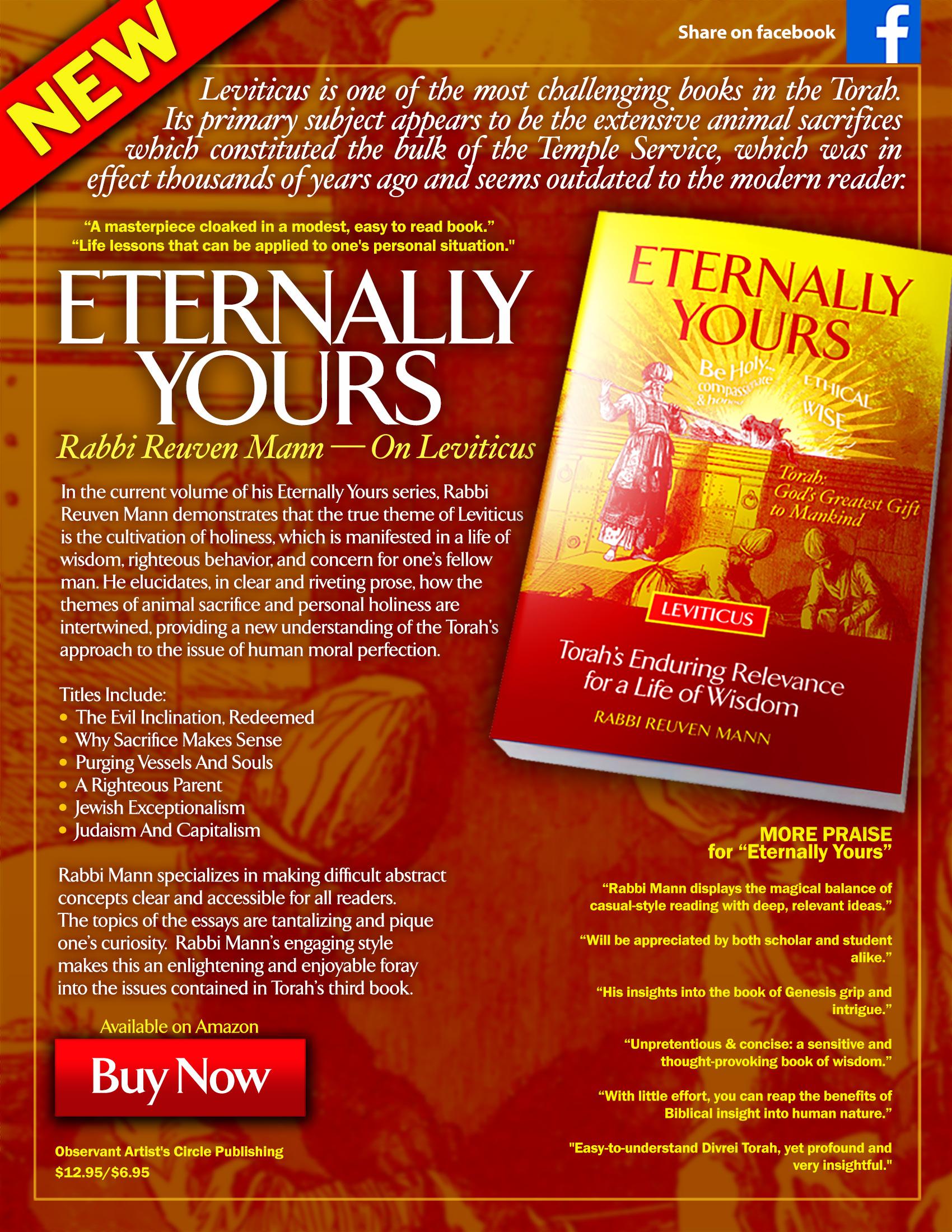MEGILAS ANTIOCHOS





















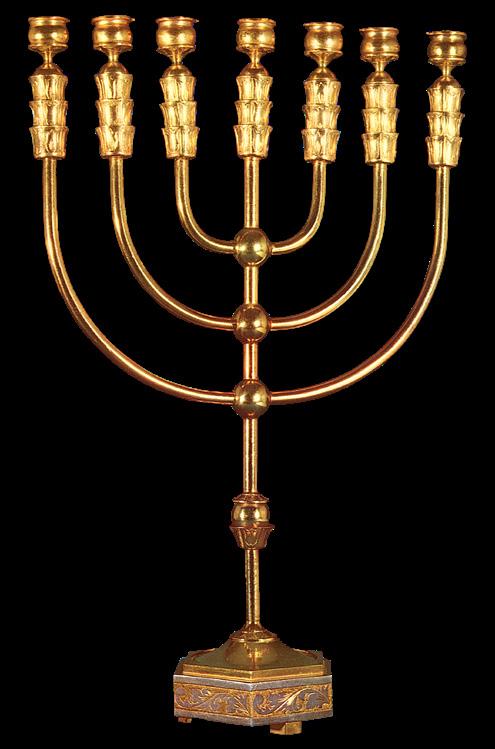
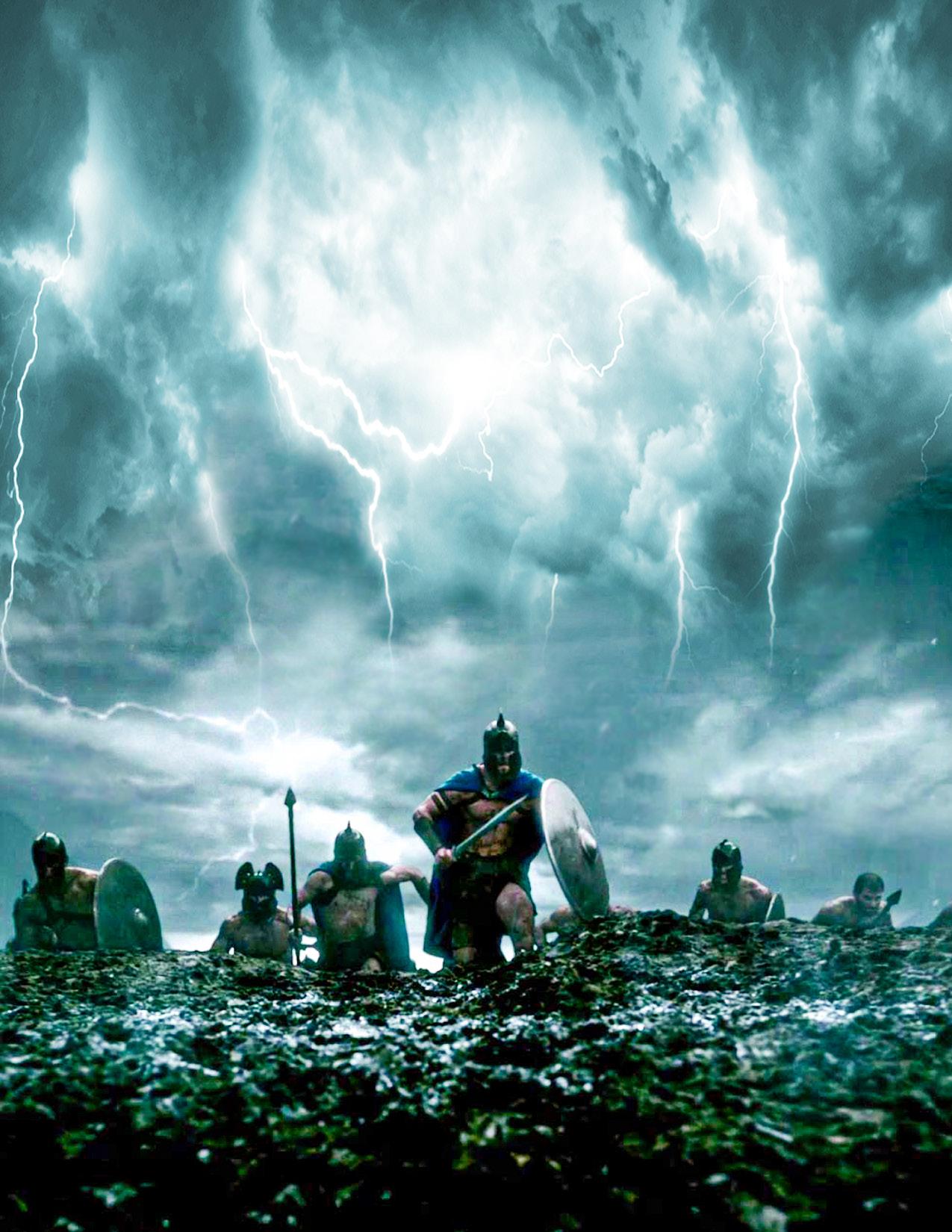


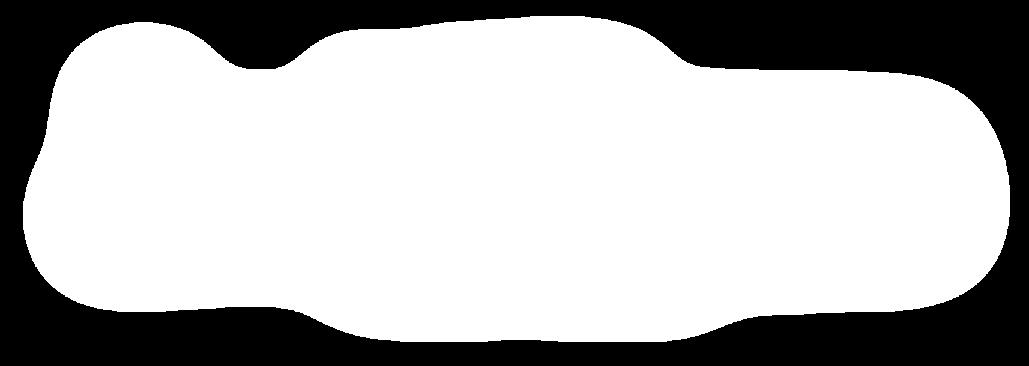
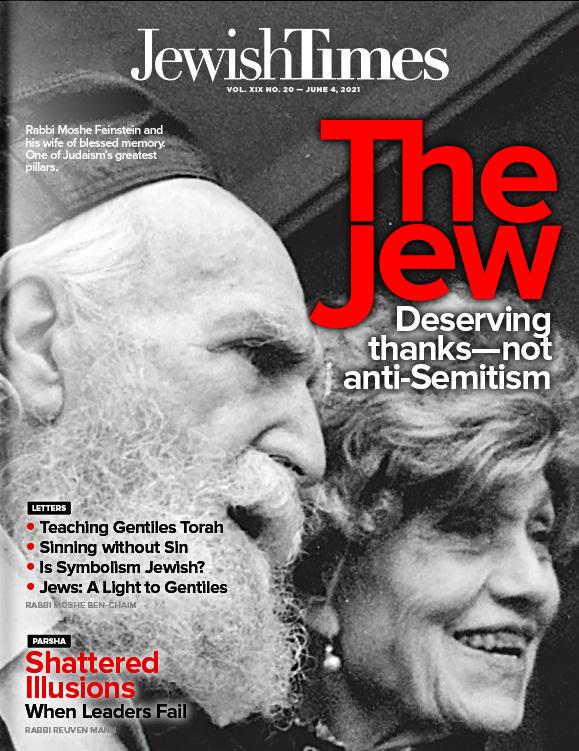

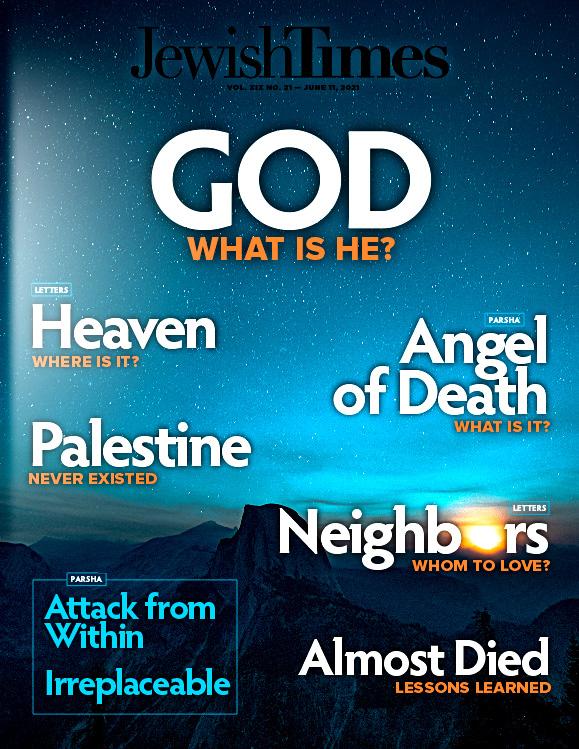


RABBI MOSHE BEN-CHAIM
Menora’s detailed design reveals secrets. It is a central lesson of Temple and man’s purpose.
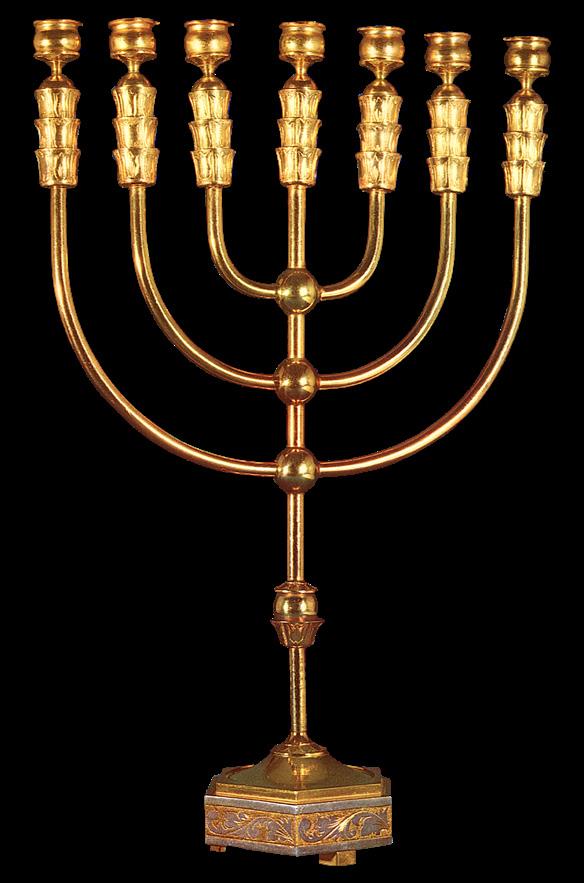



2189 years ago as the Jews faced religious persecution, the five sons of Mattisyahu displayed much courage, although greatly outnumbered. They were inspired to battle against those who wished to strip the Jewish nation of its Torah and identity. The Greeks were intent on preventing Torah observance
and coercing idolatrous practice. However, Mattisyahu's sons displayed unwavering devotion to what their minds knew was true. We read in verse 39, “We remember that which God commanded us on Mount Sinai.” They were convinced of the truth of God's revelation, His existence, and His commanding us in

What is so vital about this vessel that God chose it to embody the
His Torah at Sinai. No enemy could erase history or Torah's truths. Without Torah observance, one's life is meaningless. Mattisyahu's sons took it upon themselves to fight to preserve Torah, at all costs.
We must take this lesson to heart, as this is our celebration of Chanuka: to proclaim God’s intervention—even miracles—when we adhere to His word. Devotion to a Jewish life—God's words—earned the Jews of Chanuka miraculous salvation. Many leaders have not learned from history, and keep Israel under the sword. As long as God's word is absent from national interests, God may not assist us. This is the dichotomy: most Jews today celebrate Chanuka, recalling God's intervention when Torah was defended, while most Torah laws today are ignored. Lighting the menorah with our families, we testify to God's providence, saving those Jews who followed Him by risking their lives to preserve Judaism for all. Therefore, God stepped in. Until the Jews demonstrated their devotion, there was no divine intervention. Once these few brave souls declared the essentiality of Torah adherence through action, God protected them, and gave “the many into the hands of the few, the wicked, into the hands of the righteous.”


Today we perish by the hands of those like Antiochos. Jews, Children of Israel, IDF, and leaders of our people are wise to heed Chanuka's lesson. Is this not why we celebrate? God enabled five brothers to defeat the armies of our enemies. God is not sleeping. God is not weak. He sees our travail at this time too. God's word and history attest to the fact that He saves those who follow him. Until we follow His Torah, until we see with clear conviction that not based on political and military strategies alone will we be saved, but also with Torah as our guide, we may continue to su er.
according to His word. In line with this promise, we may seek His assistance. God's word is absolute truth, which enables our existence. When living in line with God's word, He has many vehicles to protect us. This is the message of so many Torah stories. But as the Shima says, He certainly will not shield us when we abandon Him. Of course it is preferred that we attach ourselves to the truth of Torah when prompted by its perfect and pleasing laws, not only for salvation's sake. But many times God removes His protection to instruct us to return to Him. Maimonides teaches that national catastrophe must not be viewed as "natural," but as God's instruction that we return to Jewish life. And if we dismiss such catastrophes as mere chance, we will make matters worse and He will hide from us.
Remember the Chanuka Story. It celebrates God, who protects those who follow Him. Proclaim its message not just with your menorah, but with your daily actions all year. We all wish happiness, health and success for our people. As Mattisyahu's sons lived and were saved through Jewish values, with God's help, we too can triumph over our enemies.
If however, we solely engage political and military considerations, denying these Torah truths, Jewish history, and God’s abilities...we ignore Chanuka’s primary message.
Recall Abraham defeating tremendous forces with just a few men. Jacob's salvation from his twin Esav. Recall the Ten Plagues, the Manna in the desert, and the splitting of the Reed Sea, where every Egyptian soldier perished without a battle. And recall this: our claim to Israel is from no other source than God's Torah: His promise to Abraham. These Torah accounts are lessons. But many Jews resist, to our own harm.
Living by Torah ideals and prioritizing Torah study is the most fulfilling life. As Torah is absolute truth, we must be concerned by God's promise to abandon us if we abandon Him. He says this in the Shima. But God also promises His great providence when we live
God commanded Torah observance for our benefit, and it is pleasing and sweet to all who investigate and appreciate its perfect sensibilities, and the beauty of all its laws. The greatest minds found God’s wisdom as the most pleasant life, from Abraham through Joseph, Moses through Kings David and Solomon, and Maimonides through Rabbi Soloveitchik. God knows what is best for His creation, for mankind, and He designed Torah as that which provides man the richest life. We have free will to succumb to laziness and the desire to be "free of restriction." But with minor e ort of study, we each can appreciate the purpose of every law, and we will then truly view our previous non-observant lives as empty, feeling fortunate we finally made the first step towards observance. We will no longer view Torah laws as restrictive, but as a great fortune, as we come to understand how each law benefits us is in the most profound manner. King David referred to Torah study as a "plaything" and King Solomon described it as the greatest mitzvah. If the wisest men had great estimation of Torah, should we not investigate what exactly Torah study is, and how we can attain a most fulfilling and happy life, as God designed us to enjoy?
Following His laws, even the few will be victorious over the many. Happy Chanuka to all!
We must include the Torah's direction when determining our course of action in all national matters.










 Translated by Rabbi Moshe Ben-Chaim
Translated by Rabbi Moshe Ben-Chaim
Arbitrary paragraph breaks have been added every 10 verses for ease of reading. These breaks do not exist in the original.
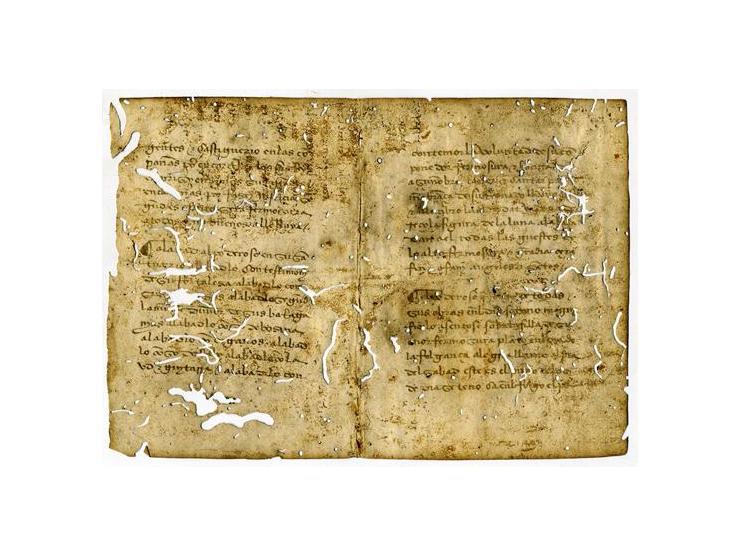
"1. And it was in the days of Antiochos, king of Greece, a great, mighty king was he, and he was strong in his reign and all kings listened to him. 2. And he conquered many cities and mighty kings, and he destroyed their palaces, their temples he burned with fire, and their men he imprisoned in jails. 3. From the days of Alexander the King, there arose no king like him on all sides of the river. 4. And he built a great city on the sea shore to be his house of kingdom, and Antiochos called the city by his name. 5. And also his second in command Bagris built another city next to it and Bagris called it by his name, and so is its name until this day. 6. In the twenty third year of his reign, it was the two hundred and thirteenth year of the building of the Temple, he considered to ascend to Jerusalem. 7. And he answered and he said to his o cers, "Do you not know that there is the Jewish people in Jerusalem amongst us? 8. To our god they do not sacrifice, and our religion they do not practice and the king's decrees they forsake, to do their religion. 9. And they also hope for the day of the dethroning of the kings and rulers and they say, 'When will our King rule the seas and dry land, and the entire world will be given to our hand?"
10. It is not honorable to the kingdom to leave them be on the face of the earth. 11. And now let us come and we will ascend on them and nullify their treaty that was cut with them concerning Sabbath, the new Month and
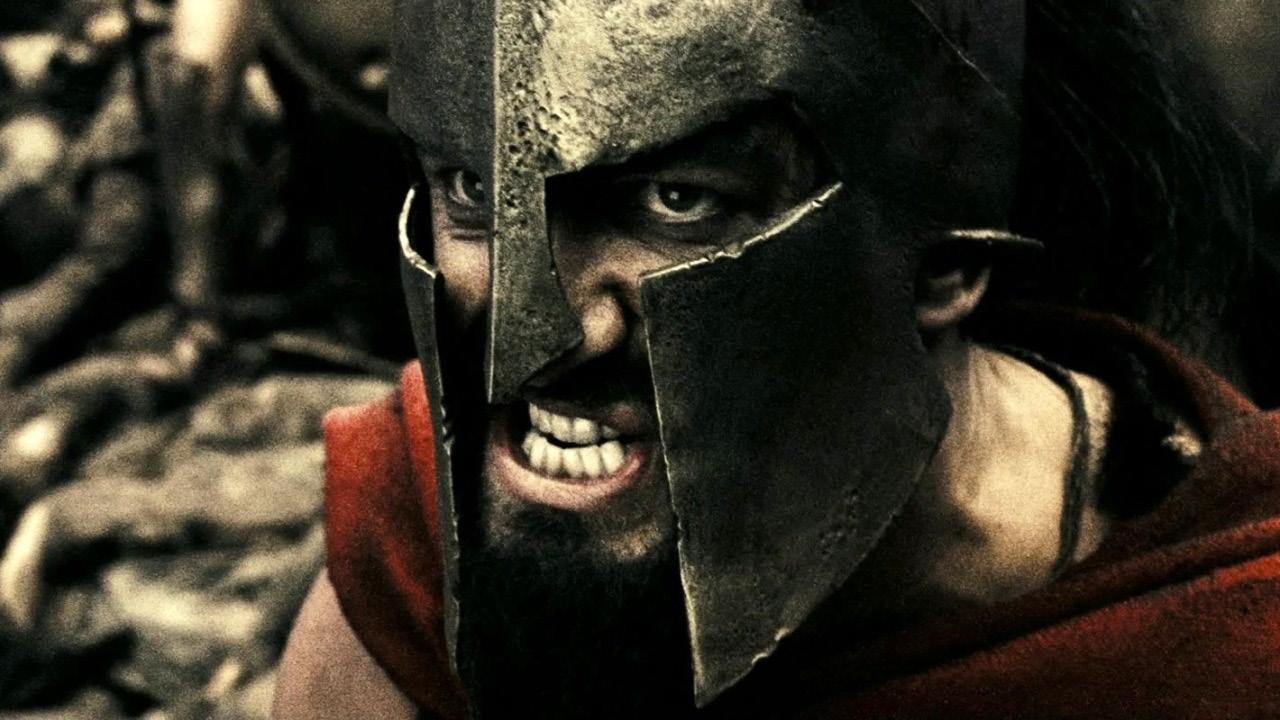
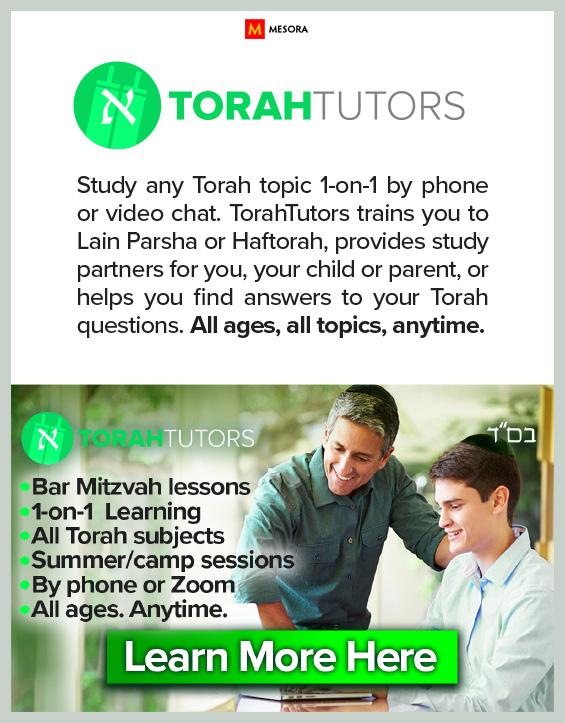
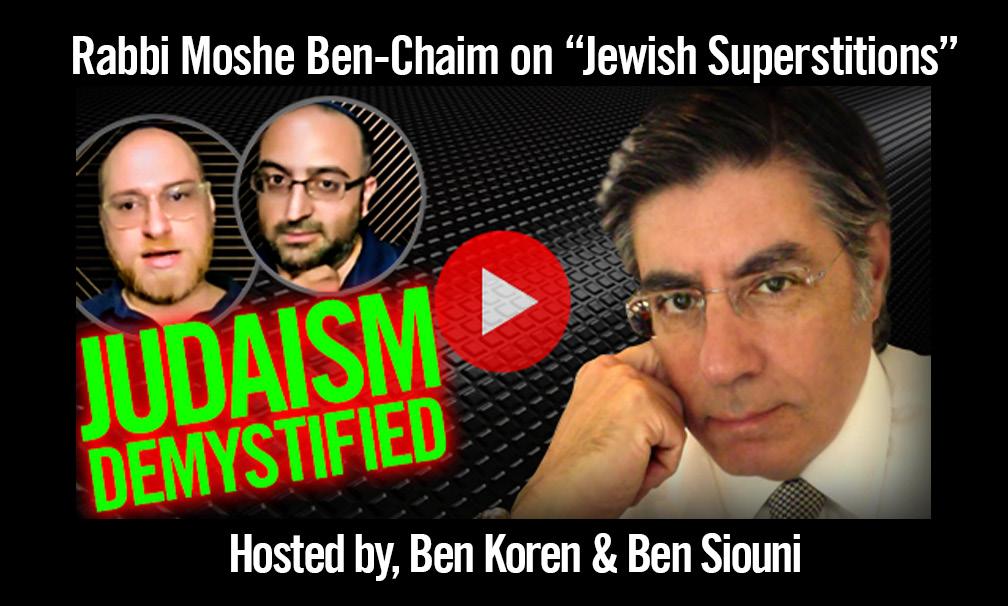

circumcision.'" And the matter was good in the eyes of his o cers and in the eyes of his entire army. 12. At that time, Antiochos the king arose and he sent Nikanor his second with a great army and many people and they came to the city of Judah, to Jerusalem. 13. And they slaughtered a great slaughter and built an altar in the Temple in the place where the God of Israel said to His servants, His prophets "Where I will cause to dwell My manifested presence eternally", in that place, they slaughtered the pig and they brought its blood to the sanctified courtyard. 14. And as this occurred, when Yochanan son of Mattisyahu the High Priest heard these doings occurred, he was filled with anger and rage, and the countenance of his face changed, and he counseled in his heart what should be done on this. 15. And then Yochanan son of Mattisyahu made himself a sword two spans long, one span wide, covered under his clothing. 16. And he came to Jerusalem and stood in the gate of the king, and he called to the gatekeepers and he told them "I am Yochanan son of Mattisyahu, I have come to come before Nikanor." 17. And then the gatekeepers and watchers came and told him the High priest of the Jews stands in the opening, and Nikanor answered and said to them, "Let him surely enter." 18. And then Yochanan was brought in before Nikanor and Nikanor answered and said to Yochanan, "Are
you one of the rebels that rebels against the king and desires not the peace of his kingdom?"
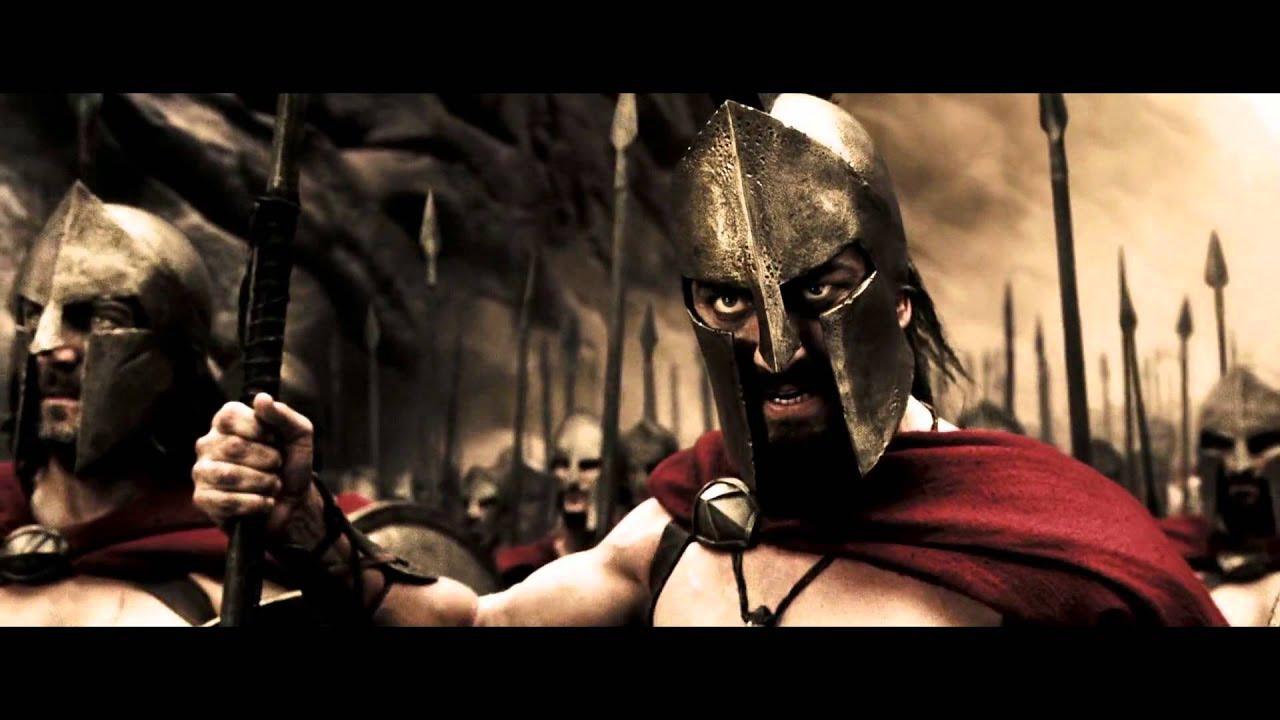
19. And Yochanan answered before Nikanor and said, "I am he, now I come before you, that which you wish I will do."
20. And Nikanor answered and said to Yochanan, "If as my will you will do, take a pig and slaughter it on the altar and robe in the king's clothing and ride of the king's horses, and as one of the kings beloved you will be." 21. And as Yochanan listened, he responded a thing, "My master, I fear from the children of Israel, perhaps they will hear I have done so and they will stone me with rocks. 22. Now let all men leave from before you, perhaps they will make the matter known." Then, Nikanor caused all men to leave from before him. 23. At that moment, Yochanan son of Mattisyahu lifted his eyes to the heavens and assembled his prayer before his God and he said, "My God and the God of my fathers Abraham, Isaac and Jacob, please do not give me into the hand of this uncircumcised, because if he will kill me, he will go and praise in the house of Dagon his god, and say 'My god has given him to my hand.'" 24. At that moment, he stepped towards him three steps and plunged the sword into his heart, and he threw his corpse into the sanctified courtyard. 25. Before the God of heaven, Yochanan answered and he said, "My God, do
not place on me sin that I have killed in the sanctified (area), now, so also do similarly to all the people that come with him to pain Judah and Jerusalem." 26. Then went out Yochanan son of Mattisyahu on that day and warred with the people and slaughtered in them a great slaughter. 27. The number of the slain that he slayed on that day was seventy two thousand seven hundred that were killed these to these. 28. On his return they built a pillar on his name and called it "Maccabee Killed the Mighty." 29. And it was that king Antiochos heard that his second in command Nikanor was killed, it grieved him much, and he sent to bring Bagris the wicked that mislead his people.
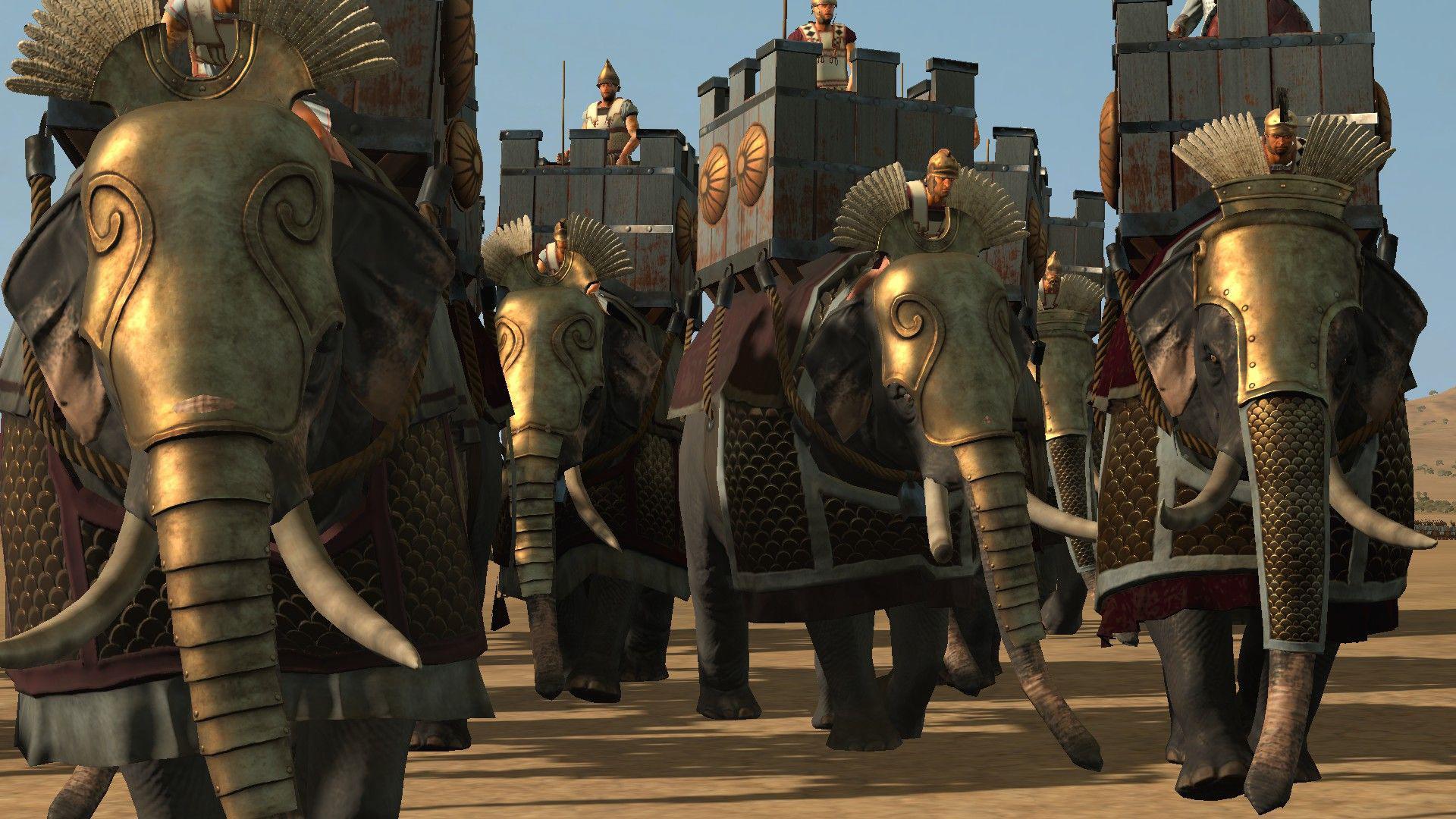
30. And Antiochos answered and said to Bagris, "Do you not know, have you not heard what the children of Israel have done? They killed my army and looted my camp and my o cers? 31. Now, on their money you are trusted or their houses are yours. Come, and ascend upon them and nullify the treaty which was cut with them (by) their God, Sabbath, the New Month and circumcision." 32. Then Bagris the wicked and all his camp came to Jerusalem and slaughtered in them a great slaughter and decreed a complete decree on Sabbath, the New Month and circumcision. 33. When this occurred that the matter of the king was urgent, there was found a man who circumcised his son and they brought the man and his wife and they hung him in front of the child. 34. And also the woman who bore the son, after her husband died and circumcised him at eight days, she went up to the walls of Jerusalem and her circumcised son in her hands. 35. And she answered and said, "To you, Bagris the wicked, you intend to nullify from us the treaty that was cut with us, the treaty of our fathers will not be nullified from us, Sabbath, the New Moon and circumcision from our children's children, it will not be removed." 36. And she
dropped her son to the ground, and she fell after him and they both died together. And many of the children of Israel that did similarly in those days, and they did not veer from the treaty of their fathers. 37. At that time, the children of Israel said, "These to these, let us go and rest in the cave, lest we desecrate the Sabbath day, and they slandered them before Bagris. 38. Then Bagris the wicked sent men girded for battle and they came to the opening of the cave and said to them, "Come out to us, eat of our bread and drink of our wine and our actions you shall do." 39. And the children of Israel answered, "These to these, we remember that which God commanded us on Mount Sinai, ‘Six days you shall work, and do all your labor, and on the seventh day rest’. Now it is better for us that we die in this cave than desecrating the Sabbath day."
40. When this happened that the Jews did not come out to them, they brought wood and burnt it at the opening of the cave and there died about a thousand men and women. 41. Afterwards, there came out five sons of Mattisyahu, Yochanan and his four brothers and they warred with the people and slaughtered a great slaughter and drove them to the isles of the sea because they trusted in the God of heaven. 42. Then Bagris entered one ship and fled to king Antiochos and with him were men, escapees of the sword. 43. And Bagris answered and said to king Antiochos, "You the king, placed a command to nullify from the Jews Sabbath, the New Month and circumcision, a great deceit and rebellion in its midst. 44. That when there went all the people and nations and languages, they could not defeat the five sons of Mattisyahu. From lions they are stronger, and from eagles they are more swift, and from bears they are more quick. 45. Now king, I o er you good counsel, and do not war with few men, for if you war, you will be embar-
rassed in the eyes of all kings. 46. Therefore, write and send books in all cities of your kingdom, that there come o cers of war and not leave one of them, and also elephants wearing armour with them." 47. And the matter was good with king Antiochos, and he sent books to all cities of his reign, and there came o cers of all the people and kingdoms, and also elephants wearing armour came with them. 48. A second time Bagris the wicked arose and came to Jerusalem, he broke the wall, and he cut o the water supply, and he broke in the Temple thirteen breaches and also from the stones he broke until they were like dust and he thought in his heart and said, "This time I will not be overtaken because of the numbers of my army and might of my hand." But the God of heaven did not think so. 49. And when the five sons of Mattisyahu heard, they arose and came to Mitzpeh Gilead, that were there the remnant of the house of Israel from the days of Samuel the prophet.
50. They decreed a fast, and sat on ashes to seek out mercy from before God of heaven. 51. Then there fell good counsel in their hearts, Judah the firstborn, Simon the second, the third Yochanan, the fourth Yonasan, the fifth Elazar. 52. And their father blessed them and so he said, "Judah my son, I liken you to Judah son of Jacob who was equated to a lion. 53. Simon my son, I liken you to Simon son of Jacob who killed the inhabitants of Shechem. 54. Yochanan my son, I liken you to Avner son of Ner, o cer of the army of Israel. Yonasan my son, I liken you to Yonasan son of Saul, who killed the Philistine people. 55. Elazar my son, I liken you to Pinchas son of Elazar who was jealous for his God and saved the children of Israel." 56. On this, there went out the five sons of Mattisyahu on that day, and warred with the people, and slaughtered in them a great slaughter, and there was killed from them Judah. 57. At that moment when the sons of Mattisyahu saw that Judah was killed, they returned and they came to their father. 58. And he said to them, "Why have you returned?" And they answered and they said, "On account that our brother was killed who was equated to all of us." 59. And Mattisyahu their father answered and said to them, "I will go out with you and I will fight with the people, lest the house of Israel perish, and you are frightened on your brother."
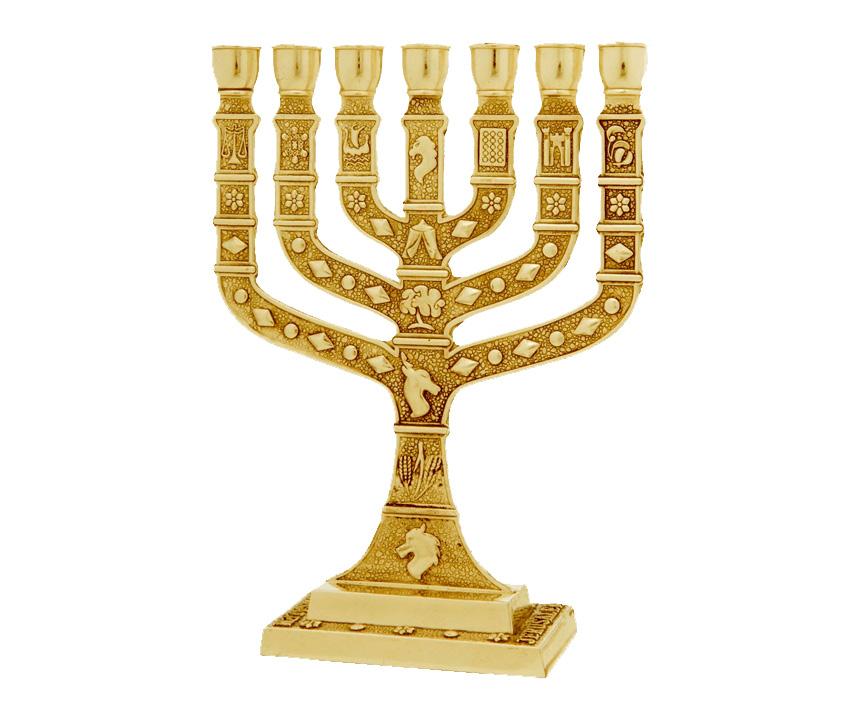
60. And Mattisyahu went out on that day with his sons and fought with the people. 61. And God of heaven gave all the mighty of the nations into their hands. And they slaughtered a great slaughter, all who seized the sword, and all who drew the bow, o cers of war and the seconds in command, there was not left one remnant, and there fled the rest of the people to the cities of the sea. 62. And Elazar was involved in killing the elephants and he was submerged by the chariots of the elephants, and when they returned, they looked for him among the living and among the dead, and they could not find him. And afterwards they found him that he was submerged by the chariots of the elephants. 63. And the children of Israel were gladdened that there was given to their hands their enemies. From them they burned with fire and from them they pierced with the sword, and from them they hung on trees. 64. And Bagris the wicked that misled his people, the children of Israel burned him with fire. 65. And then, Antiochos the king heard that Bagris the wicked was killed and all o cers of war with him, he entered into a ship and fled to the cities of the sea, and it was that each place he came to there, they mocked him and called him "the runaway." 66. Afterwards, the children of the Hasmoneans
came to the temple, and they built the broken gates and they closed the breaches, and purified the courtyard from the casualties and from the impurities. 67. And they searched for pure olive oil to light the menora and they did not find but one canister that had the seal of the ring of the High Priest and they knew that is was pure, and it contained a measurement to light for one day. 68. And God of heaven Who causes to dwell His name there, gave a blessing and they lit from it eight days. 69. Therefore there established the children of the Hasmoneans a fulfillment, and they forged a law, and the children of Israel with them as one, to make these eight days days of drinking and happiness as the appointed days written in the Torah, and to light on them lights to make known what was done to them (by) the eternal God of heaven.
70. And on them, one may not eulogize, nor to decree fast days, or have a fast, except if it was accepted on it prior to this and pray before their God. 71. But the Hasmoneans and their children and their brothers they did not decree on them to nullify service of work. And from that time, there was no name to the kingdom of Greece. 72. And there received the kingdom, the children of the Hasmoneans and their grandchildren from that time until the destruction of the Temple two hundred and six years. 73. Therefore, the children of Israel from that day in all their exiles guard these days and call them days of drinking and gladness from the twenty-fifth day of Kislev, eight days. 74. From that time and eternally, there should not be removed from them, that were in their Temple, priests, Levites and their wise men who established upon them and upon their grandchildren eternally."
Other prayer books add these verses:
And these days, they arose and accepted on themselves and on their children and on their grandchildren eternally, the priests, Levites and wise men that were in the temple, and they were not removed forever. The God that did with them a miracle and a wonder, He should do with us miracles and wonders and sustain with us the verse that was written as the days of your Exodus from the land of Egypt, "I display wonders," Amen. ■
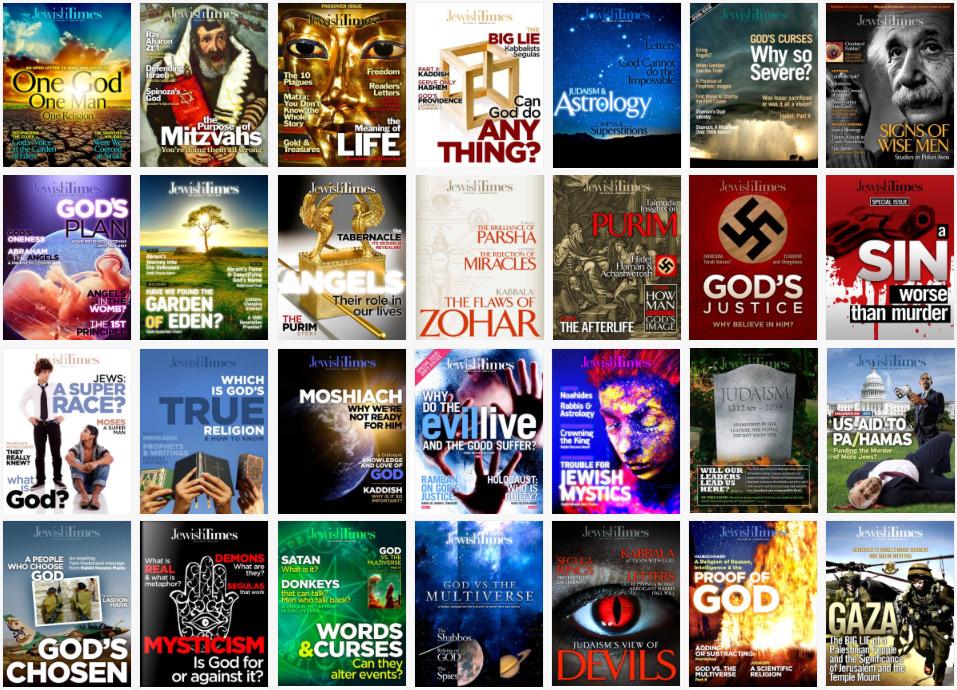



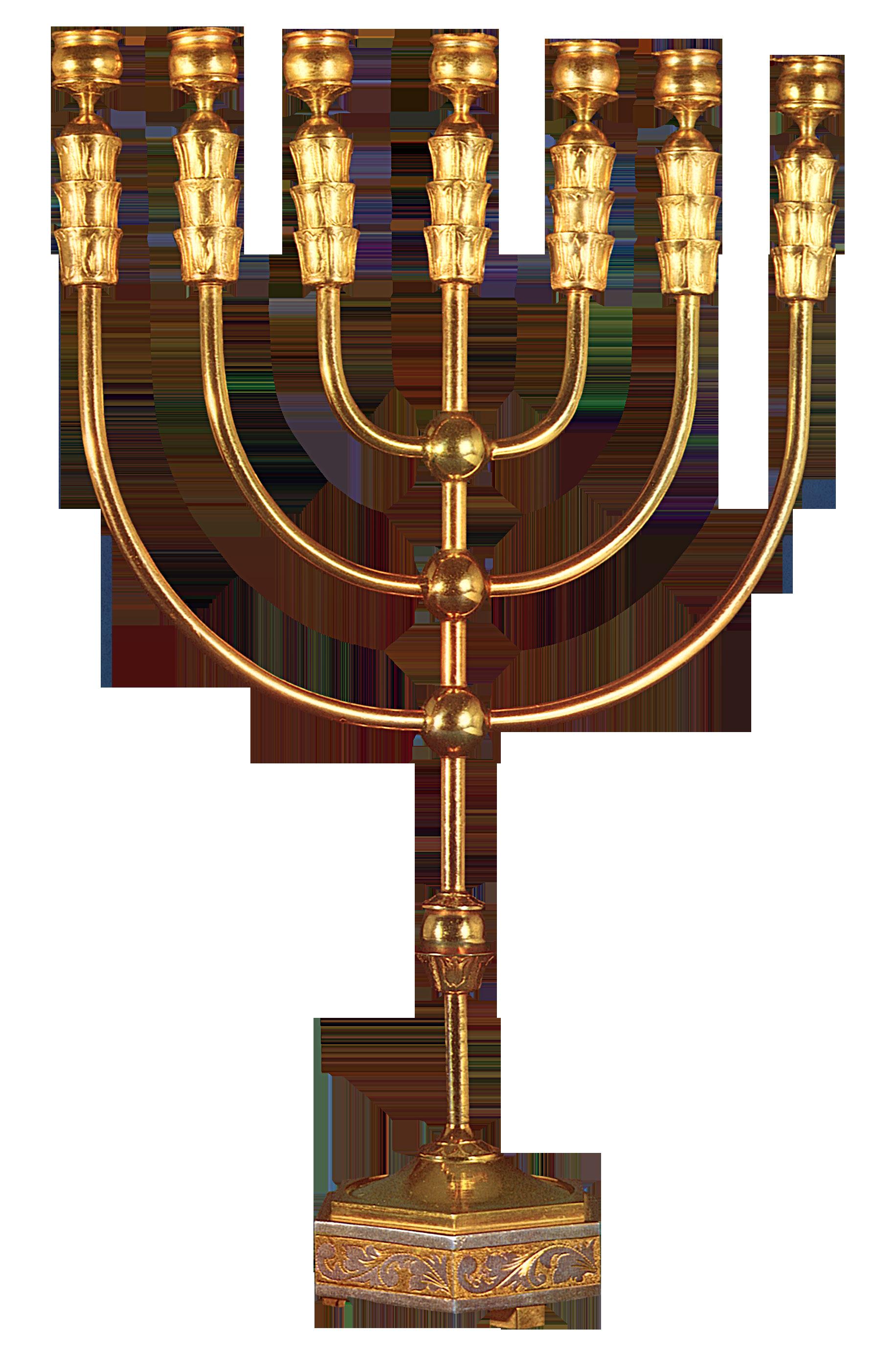
Unlike other religions toting arbitrarily-designed ceremonial objects and garb, and tapestries that express raw human fantasy…each of God’s Torah laws and designs are precise, containing fundamental intellectual and moral truths.
Of all the Temple’s vessels, the Menorah is most perplexing. As Einstein would not dismiss any order detected in the universe, we too cannot dismiss the Menorah’s intricate details. With them, God intends to share something profound with mankind. While some details may be technical, patient study of the Menorah is rewarded with new insights and increased appreciation for God’s design and purpose of this mitzvah, and of man. Without understanding the Menorah’s designs and laws, we miss His intended lessons.
Let us first identify the unique features of the Menorah, and then progress in an orderly manner to define those features. While there is much room for drash and allegory, it is vital for the sake of arriving at the true lessons of Menorah, that we do not overstep, or suggest ideas that are not loyal to Menorah’s designs and laws.

Unlike most other vessels, the Menorah was made of pure gold, like the Ark’s cover. Both could not be made in parts, and then subsequently assembled. They were both hammered into their final form from a single block of gold. Why?
Iconic to Menorah is its six branches emanating from a center seventh branch: three branches protruded from both sides, left and right, totaling six protruding branches, plus a seventh center stem. Why do the six branches emanate from the seventh; not standing on the ground independently, on six separate

bases, just like the seventh stem?
On top of all seven branches was a basin for the oil. The wicks of all six branches faced towards the center stem: those on the right faced left, and those wicks on the left faced right. And the direction of the center stem’s wick faced towards the Holy of Holies. Why?
On each of the six branches were unusual designs: three cups, one flower and one sphere. On the center stem there was an additional cup, three additional spheres (out of which the six branches protruded), one additional set of a flower, cup and sphere, and finally one more flower at the base. The base had
three legs.
We readily understand Moses’ perplexity of the Menorah’s design, that is, until God showed him a vision of it. We too wonder what these cups, flowers and spheres mean. And why were there more cups, than flowers and spheres? But the near duplication of design on all seven branches must teach something. And the seventh’s additional designs too teach another lesson. Furthermore, a miracle occurred that the center stem’s wick burned unnaturally longer than the other six branches.[1] What was the need for this miracle? What is that lesson?
In general, what is Menorah: a lamp? The Talmud states that God does not need light, for He lit our journey through the desert! King Solomon sought to highlight this unnecessary need for light precisely by designing the Temple’s windows narrow on the inside, and wider on the outside[2]. Menorah was not for the purpose of physical light.
Now, let’s proceed to answer this enigma, step-by-step…
“Nare mitzvah, v'Torah Or – A (single) flame is a command, and Torah is light (Proverbs, 6:22).”
Here, King Solomon alluded to a primary metaphor: wisdom is likened to light. Furthermore, the wisdom of one mitzvah illuminates to 'some' degree: a command is equated to one flame. While observing Torah entirely, removes all darkness. It is “light.” It is only with a broad understanding attained through observing "all" of Torah, that we see the truth in all areas, as if one walks in broad daylight. The Menorah, then, is not for God, as He needs nothing. The Menorah is to embody the concept of wisdom, light. And in Proverbs (chap. 8) King Solomon personifies wisdom as metaphorically “calling out to man.” Verse 19, wisdom says, “My fruit surpasses fine gold.” We thereby find Torah equating fine gold to wisdom. Therefore, Menorah’s light and requirement to be made of pure gold both attest to its equation to wisdom. Additionally, hammering the Menorah out of one gold block instead of making it through assembly requires greater wisdom, and embellishes this idea.
What wisdom does Menorah impart?
The first step in answering this question, is to recognize Menorah’s unique aspects. Seven branches, where six emanate from the center seventh stem, clearly parallel the Six Days of Creation, and the Sabbath. Just as our first blessing each morning – “Baruch She’amar” – defines God as the God of creation, Temple equally requires this concept. The most primary notion of Temple service is that the nation firmly attests to God as the sole cause of the universe. Menorah delivers this message. Rashi on Exodus 28:6 cites Talmud Yuma regarding the priest’s clothing, that with every six strands of blue, purple, red and linen, there was wound a seventh strand of gold thread. Again, the concept of six days of Creation is highlighted.
But if, as Sforno teaches, subsequent to the sin of the Gold Calf, Temple came to correct man’s notions, what does Menorah correct?
before us, for this Moses, the man, who took us up from Egypt, we know not what has become of him (Exod. 32:1).” Here, immediately prior to fashioning the Gold Calf, the Jews expressed their attachment to the “man” Moses. Our very point. But in fact, the physical world’s existence is flimsy, always depending on God’s will for its continued existence. “He renews every day regularly, the works of Creation (Daily Prayers).” The Menorah corrects the false notion of an absolute physical world. Six branches – six days of creation –are dependent on the seventh. Decoded, this hints to the physical world (six branches) as dependent on God’s will and His natural laws, or the metaphysical world, referred to as the seventh branch. The seventh branch – the sabbath – has as its goal man’s removal from physical creativity, and the engagement in wisdom.
The sin of those who created the Gold Calf was that they viewed the physical world as what is truly “real.” They viewed tangible things as absolute truths, more true than the abstract metaphysical God to whom they could not relate.
In truth, the physical world, this universe, does not have to exist.

It does, only due to God’s kindness. The six branches “depend on the seventh,” as they emanate from the latter. This teaches that the continued existence of the universe – the six days’ creations – depend on God’s will, as the universe cannot sustain itself. God willed all matter into creation, and He can equally will it out of existence. This design of six branches “depending” (suspended) on the seventh, corrects the fallacy harbored by the Gold Calf followers. They felt a physical object was “more real” than something abstract. “Arise and make for us a god that will go
We must realize that the universe is guided by metaphysical laws that are “outside” of the universe. And these laws are more real than the physical world, as they guide the physical world. If one thing guides another, the former is more real than the latter. Natural law is falsely viewed as “inside” all physical objects. But science likes simplicity. We do not say each body has its own law of gravity inside itself, in an attempt to explain why all elements fall after being lifted. Our minds say there is a “single” law of gravity that governs everything, and is external to all matter. Laws are metaphysical realities. We find this approach more pleasing and sensible. Similarly, God does not will each leaf to fall from every tree. Rather, we find far greater expression of God’s greatness by viewing such phenomena as a result of His “laws”, not His independent attention to each leaf. A law removes the need for individual attendance to all leaves. It is much more pleasing to our minds, and we view God greater with such an explanation.
The six branches depending on the seventh for their suspension, refers to the six days of Creation depending on metaphysical laws for their existence. The Gold Calf disease can be corrected by recognizing that physical objects are subjugated to the laws that govern them. To embellish this point, the seventh center stem had a miracle of its flame burning longer than its oil quantity could sustain. This demonstrated that the physical laws that typically would cause that flame to extinguish, were overridden by God’s will. Natural law can be altered by the metaphysical world, or God’s will.
To further express the subjugation of the physical word to the metaphysical, all six branches had their wicks pointing towards the center branch: a manner of deference. But interesting too is that the center branch itself had its wick pointing towards the Holy of Holies! This teaches that even those very metaphysical laws are not absolute, but they too are God’s creations, and subject to His will. (The Holy of Holies is from where God caused His communications to emanate.)
were four elements: earth, air, fire and water. But man later learned there exists over one hundred elements as identified in the Periodic Table. Varying properties of each element, from carbon to uranium, teach us about God’s universe.
We then witness various “forms” of creation, such as living species and minerals. For example, we learn from the di erent mouth structures of beasts, which are carnivores and which are vegetarians. Carnivores have much wider jaw openings and fanged teeth to help in their hunt and eating. Vegetarians, like cows, have smaller jaw openings. Fish have vertical fins, while mammals like dolphins and whales have horizontal fins in order to propel them upwards to rise above the surface for air.
Now we must address the Menorah’s unique decorations. Each branch represents one of the six days of creation. Yet, despite the di erence in each day’s creations, all six branches are identical. What, then, must we say these cups, flowers and spheres refer to?
It would appear, what is identical on all days are the main categories of creation. I refer to substance, form, and properties, or function. Regardless of the specific created entities, all matter possesses these properties. And it is precisely by studying these properties that man attains God’s intended lessons. These are the areas of wisdom, which each day imparts.
As we study the universe, we identify numerous “elements.” Originally, man assumed there

But what imparts to man the greatest appreciation of God’s wisdom seen in creation, is the “functioning” of matter, or rather, the “systems” we witness. The solar system, digestive system, weather, etc. impress us most. And when many systems coexist and complement each other as is found in the human being's respiratory and circulatory systems, we are even more amazed. The reason a system is most impressive, is because it points to a greater plan, and thus, greater knowledge and planning, than in a single entity’s substance or form.
I suggest Menorah’s cups refer to creation’s properties and functions (systems), Menorah's flowers refer to form, and its spheres refer to raw amorphous substance. While Earth’s substances (Menorah’s amorphous sphere), and the form of all creations (Menorah’s flower) carry important lessons, Menorah’s cups (properties & systems) are more numerous on each branch. I believe this may indicate it is through studying the laws and systems of the universe whereby man attains the greatest appreciation of God’s wisdom. An apple is a beautiful creation, but when we study the revolution of the Moon and Earth, which cause seasons, combined with the precise distance of Earth
from the Sun, and its axis, we are amazed at the plan, and with God. Therefore I believe there are more cups on each branch to emphasize this point that the study of the universe's functions—not substances or form—reveals greater wisdom.
Through our study of these three areas, we view God’s wisdom. Thus, each branch, each day of creation, intends to o er man expressions of God’s wisdom, as seen in elements like iron and hydrogen, in various forms like plants and animals, but mostly, “how” these creations operate, seen in the numerous systems that guide our universe, from the subatomic world, up to the birth of stars. (The reason we find cups, flowers and spheres on the seventh branch, despite the fact that no creation took place on day seven, is to teach that the physical creations of the six days are based on their metaphysical designs – the seventh branch.)
The reason the six branches emanated from spheres (and not flowers or cups) on the center branch, teaches that the six days' creations were formed from that substance (sphere) that came into existence on the first day. That is, no new matter was created on days 2, 3, 4, etc. from which God formed the additional creations on those days; all creations on all days were made from the initial matter created from nothingness on day 1.
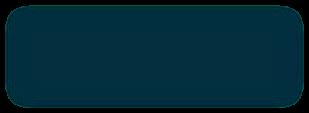
Menorah is a lesson in the dependent and limited nature of the physical world. This world was created. Nothing demands it exists other than God's will. God also determined what properties all creations possess. Placing more trust in physical objects than in God, and certainly imagining physical things help us in any way other than through their natural properties, is foolish. We must not
value Gold Calves more than God, who controls all physical entities, and prohibits their worship. However abstract He is and however emotionally displeasing we initially find it, we must follow our minds and strive to become convinced that physical entities cannot answer our prayers, be they Western Walls, red bendels, dead Rebbes, or Gold Calves. Instead, we are to follow God and His lessons. God provided manna. He performed numerous miracles. And although we are commanded to follow His natural laws and toil to earn our living and not rely on miracles, prayer teaches us that ultimately, God is the source of our success.
There exists a physical world with laws that govern who eats and who starves. Sitting idly while a farmer toils each season, the idle person dies of hunger while the farmer thrives. But the farmer who is a Torah Jew knows this: despite droughts, a righteous person ultimately relies on God, who can
deliver his daily bread. The righteous Jew plans according to nature but relies on God to bring matters to success. He gives tzedaka without fear of diminishing wealth, and in fact views charity as a means of enriching his lot. And although he abstains from work each Sabbath, he does not fear this will diminish his wealth. God is his rock.
Menorah itself is an example that the details of God's creations must be studied to witness God’s wisdom: as we study every inch of the universe, we also study the Menorah and all other commands. Menorah's primary lesson is that the universe is subjugated to the metaphysical world, to God's will. Menorah corrects the flaw of the Gold Calf followers and hopefully will correct the false views of those Jews who still place their hopes in anything except God alone. ■
[1] Menachot 86b

[2] Kings I, 6:4, Menachot 86b
What is the purpose of gematria? Can we truly learn anything from the numerical representation of words?
What is beneath these creative yet apparently simplistic interpretations?
While jointly pursuing semichah and a PhD in mathematics, it seemed natural for Elie Feder to love gematria. However, he was bothered by these compelling questions. That is, until he discovered the purpose of gematria.
Gematria Refigured presents the discoveries that led to the author’s transformation from a gematria skeptic to a gematria lover. It develops a theory which elucidates how the Torah and Chazal use gematria to direct us toward a very specific type of idea. Through its many examples, this work illustrates how gematria can help us uncover novel insights, while providing interesting and clearly formulated perspectives into many mitzvos, themes, and stories in Tanach.
Buy on Amazon, click below: bit.ly/Gematria1
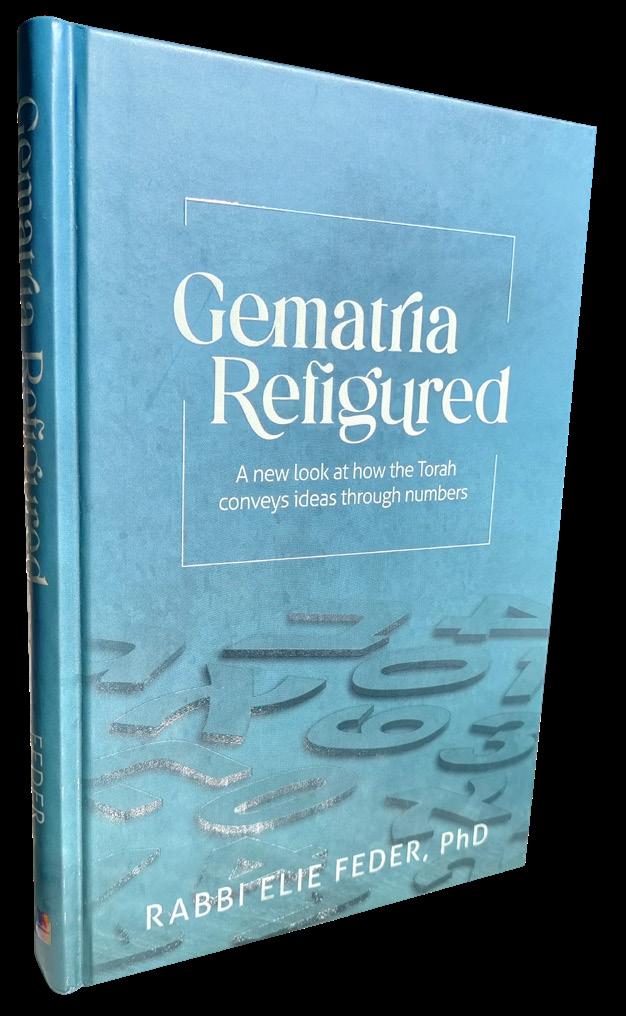
Gematria is a polarizing topic. While many love it, many others view it with skepticism.
Subscribe by emailing: Join@Mesora.org

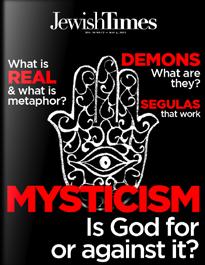

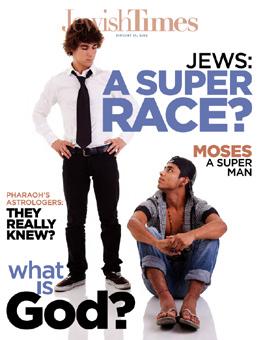

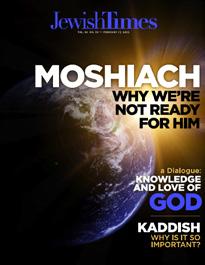

letters.
Enjoy all 627 back issues free: www.Mesora.org
Tohar Hayihud is a masterpiece of intelligent Torah thought. The Rabbi cites authentic Torah sources, Rishonim and great minds who, over the centuries, have rejected Kabbala’s claims as contrary to Torah. Free to download: www.mesora.org/toharhayihud.pdf
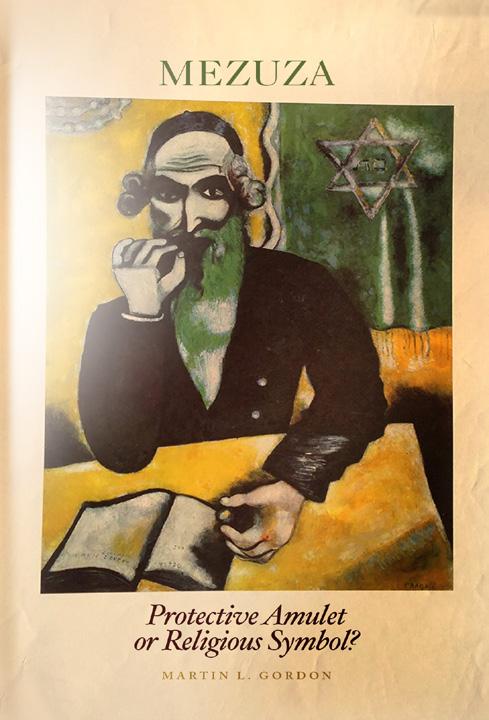
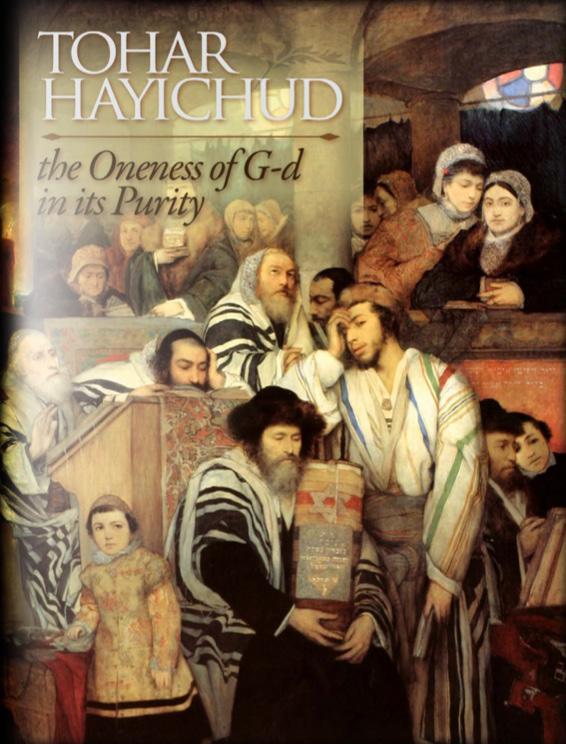
Mezuzah: Protective Amulet or Religious Symbol? addresses the popular belief in segulahs and protective devices. Martin L. Gordon refers to Torah and reason as the authorities on true Jewish concepts. Free to download: www.mesora.org/mezuza-gordon.pdf

